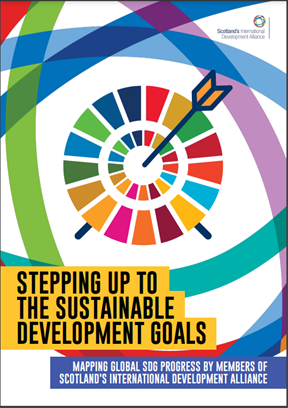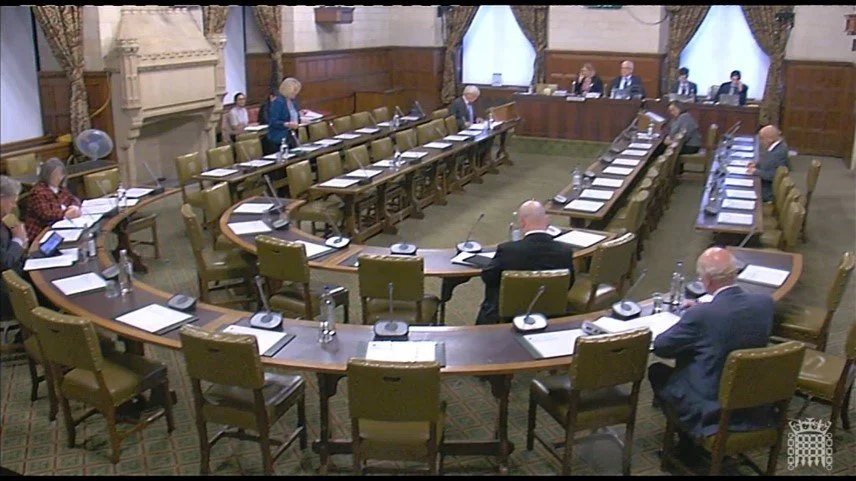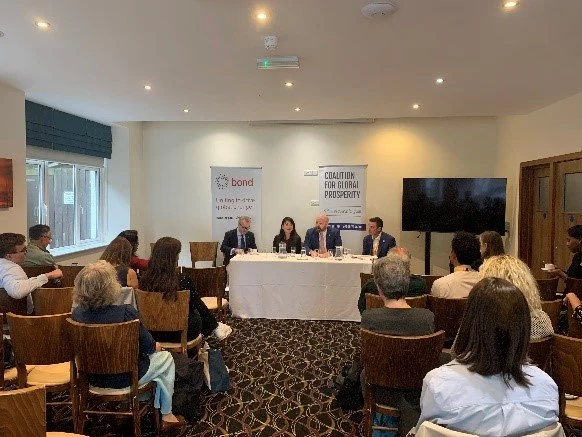November 2023 APPG newsletter
International Development White Paper published this week
The government’s International Development White Paper was published on Monday, with Minister Andrew Mitchell presenting it to Parliament on Tuesday. Parliamentarians asked a range of questions about the White Paper, and the full debate can be read here.
Dr Graham Long, an academic from the University of Newcastle who works on the SDGs, has shared an analysis of the White Paper in terms of its commitments to the SDGs, and his full analysis is attached below in an addendum.
In summary, he has concluded that the White Paper represents 1) overall, a stronger FCDO engagement with SDGs and 2) a range of commitments across the SDGs, though some lacking detail.
However, he has also identified concerns around whole-of-government policy coherence, and notes there is no reference to the UK committing to regular VNRs, and little reference to the SDGs as a framework for UK domestic policy-making.
Launch of the SDG Data and Policy Hub at Newcastle University
The UK Office for National Statistics has recently paused its national SDG reporting programme, with implications for the UK’s ability to monitor and report on its progress towards the SDGs . To fill this gap, and to respond to the broader evaluation agenda of the SDGs, a team at Newcastle University convened by Dr Graham Long will be launching a UK SDG Data and Policy Hub in December 2023.
The Hub will have three main strands of work:
Developing and reporting on three sets of indicators to track a) progress on the SDGs in the UK b) the alignment and contribution of UK international development policy to the SDGs and c) the ‘spillover effects’ of the UK’s domestic activity on global SDG progress
2. Curating a library of SDG-oriented policy-relevant work from UK academia and other sources
3. Producing new policy-oriented research around the SDGs each year responding to key themes, priorities, and opportunities.
It will seek to advance all three strands in partnership with stakeholders from government, Parliament, academia, civil society and the private sector in the UK and beyond.
The Hub would welcome expressions of interest from Parliamentarians who are members of the APPG and who would like to be involved in steering the research agenda of the Hub in its first year, co-developing strands of work, or contributing their expertise as part of an informal advisory board.
If this is of interest, please do contact Eden on ekulig@bond.org.uk
The Global Compact ‘SDG Playbook for SMEs’
Our friends at the UN Global Compact have published a ‘SDGs Playbook for SMEs’, which we would encourage all members to circulate to business contacts, either in their constituencies or elsewhere. The full playbook can be downloaded HERE.
Businesses are increasingly expected to play a pivotal role in driving positive change, and the United Nations Sustainable Development Goals (SDGs) provide a universal blueprint for a future that delivers both social transformation and business benefit. Small-to-medium-sized businesses are the backbone of industry. SMEs account for 99% of UK businesses and are responsible for turnover worth over £2 trillion. It is vital that their sustainability ambitions are raised to the standards laid out by the SDGs.
Stakeholders – from regulators to investors to customers to employees – expect all companies to be improving their sustainability performance and are prepared to reward companies that adopt this agenda and punish those that do not. The successful businesses of tomorrow are those that place sustainability at the core of their business model today.
We are hoping to circulate the playbook more widely to businesses to encourage more businesses to adopt more sustainable business practices, and hope APPG members will be interested in working together on this agenda throughout 2024. More detail to follow.
Stepping up to the SDGs – Scotland report
SIDA (Scottish International Development Alliance) has produced a report mapping progress towards the SDGs by Scottish international development organisations.
‘Stepping up to the SDGs’ reassesses how SIDA members are implementing the SDG agenda, demonstrating that SIDA members are contributing to all 17 SDGs in over 170 countries.
The full report can be read here.
UK Politics and the Sustainable Development Goals
19 October Westminster Hall debate on the SDGs
On 19 October, Vicky Ford MP secured a Westminster Hall debate on the SDGs, with 8 MPs speaking and a response from the Minister. There were contributions from APPG members Virendra Sharma, Fiona Bruce, Jim Shannon, Patrick Grady, Dr Matthew Offord and from Shadow FCDO Minister Lyn Brown.
The Minister spoke about the UK’s ongoing commitment to the Goals, and to the need for overall reform of the global international architecture.
Party Conference season – updates from Bond
Bond, the umbrella organisation for UK NGOs and the secretariat for the APPG, hosted events across all three party conferences where speakers and campaigners from across the international development sector made the case for renewed UK commitments to the SDGs.
From Bournemouth to Manchester to Liverpool, Bond organised a range of events from panel discussions to rallies, where politicians and policy-makers could hear about the importance of the SDG agenda to the UK’s development work, and how the UK can work to achieve these domestically and internationally.
We were pleased to hear commitments to the SDGs from across parties, from Minister Andrew Mitchell to Labour’s new Shadow Minister for International Development Lisa Nandy, and from APPG Co-Chair Lord Jack McConnell, who both spoke at an event at Labour party conference about Labour’s future international development policy, organised by Bond and LCID. We also hosted an interesting panel discussion at Liberal Democrat Party Conference on ‘Halfway to 2030’, with Lilei Chow from Save the Children along with Liberal Democrat Parliamentarians Lord Purvis and Lord Oates.
Addendum - International Development White Paper – Initial Assessment
By Dr Graham Long, UK SDG Data and Policy Hub, Newcastle University
(1) Overall, a stronger FCDO engagement with SDGs
The White Paper reaffirms the UK commitment to the SDGs, and talks the language of the 2030 Agenda for Sustainable Development to a far greater extent than, say, the 2022 International Development Strategy. Aside from mapping the core areas of action to particular SDGs, and occasionally calling out specific SDG targets (e.g. on remittances, 4.56-4.60, p62-3), the White Paper reinforces some of the SDGs’ key principles:
· ‘Leave no one behind’ - “We remain committed to leaving no-one behind, a core principle of Agenda 2030, and to accelerating progress on the SDGs in the UK and internationally.” (2.3)
· Partnership with countries and stakeholders, and participation – including recognising the vital role of civil society in several contexts, in the UK and globally (e.g. 2.11; 9.2-9.6).
· National priorities of partner countries as the basis for assistance – “Our country partnerships will focus on supporting countries’ own plans” (p14) - and locally-led development (2.17-2.18).
One next step should be to translate these commitments into practices, institutions and metrics. For example, when the White Paper says “The UK will prioritise the most vulnerable communities, and those at the frontline of the worst effects of climate change and biodiversity loss, when providing grant financing” (2.14, p29), consideration should be given to how this will be institutionalised in grant processes and monitored through appropriate indicators.
(2) A range of commitments across the SDGs, though some lacking detail
This is a long ‘to do’ list for government, containing at least 177 commitments (on my count). The breadth and ambition of these commitments reflect the SDGs, and the ‘core areas’ for action are all mapped against Goals of the SDGs. However, mapping at the SDG target level is extremely limited.
The novelty of the White Paper is hard to assess. In some key respects, the content here mirrors that of the 2022 International Development Strategy.[1] There, too, was an emphasis on listening and partnership; on women and girls, food security, health and climate as thematic areas; and science and technology, UK expertise, and mixed-model finance as means to achieve these ends.
A positive development is the range of commitments addressing the international system that include, but go beyond, global financial institutions. Strong language on “championing the voices of low and middle income countries” (4.5, p52) again prompts the question of how this should be translated into particular activities, and the measurable change that can be expected to result.
On the global economy, questions remain about the gap between what the UK government commits to here on tax, debt, and mobilising finance from IFIs versus the more comprehensive and radical version of a “better and fairer” global system offered by low-income countries.[2]
Overall, the commitments are very mixed. Some are timebound and specific – e.g. an illicit finance action plan for UK Overseas Territories, to be delivered by March 2024 (4.55, p62) – whilst others are preliminary and in need of development in detail, especially given that we are at the halfway point of the SDGs. As examples: “2.40. we will evaluate what we do and build the evidence on how best to accelerate progress across the SDGs” and “5.30. We will reform global markets and supply chains for forest and agricultural commodities, reducing deforestation”.
An additional next step here should be to map the commitments throughout the White Paper against particular SDG targets so that areas of concentrated action - and conversely, gaps – can be assessed.
(3) Can the SDGs help pull this strategy together?
The overarching framework for this White Paper is ‘light touch’, and here the SDGs might lend the UK strategy a stronger structure and context. The UK approach has a “clear strategic goal” with 2 parts, and then “6 core areas” (underpinned by a 7th, around using “the UK’s full capability for development”) containing at least 177 specific commitments (“we will…”) on specific themes under each (1.29, p25).
Though ending extreme poverty is central to the overall goal of the White Paper, it isn’t in the title of any of the core areas (unlike the mission on climate change and biodiversity loss, which is the third core area): reflecting that, there seems to be little discussion in the ‘core areas’ of how they come together to form a plan for poverty reduction.
The 2030 Agenda drew some of its strands together into closing sections on key “means of implementation” and “follow up and review”.[3] Voluntary National Reviews of the SDGs (including the UK’s in 2019[4]) standardly close with ‘next steps’ and priorities for action. By contrast, the White Paper ends without a sense of where the government will start on this long list of objectives.
A next step could be to (i)order these commitments in short, medium and long term time horizons, (ii)consider the organisations responsible for delivery and (iii)establish a process for following up and reviewing progress.
The core areas we have are a mix of ends – e.g. “ensuring opportunities for all” and means – e.g. “mobilising the money to finance development” “international system reform to unlock progress”; “harnessing innovation”. “Ensuring opportunities for all” seems an especially broad core area, encompassing education, health, water, social protection as well as gender equality. Given this breadth, it is not clear why hunger and nutrition sits under a different core area (core area 5).
The white paper could draw on the SDGs’ approach to presenting an “indivisible” agenda and stressing interlinkages between core areas to allow consideration of synergies and trade-offs. The presence of so many activities across so many areas and themes seems to prompt a question of strategic alignment and coordination. A mapping of White Paper commitments against the SDGs in a much more detailed way would help to ensure that the overarching structure is clear and nothing is missed, and also consider where there might be synergies and trade-offs to be explored or managed.
(4)What’s missing - whole of government action for policy coherence
Policy Coherence for Sustainable Development - the idea that policies across economic, social and environmental pillars of sustainable development, domestic and international, are coordinated and mutually supportive - is a key innovation of the SDGs. In the White Paper, there is mention of coherence in particular contexts – notably security: “a coherent approach is needed to transnational threats that fuel insecurity and undermine development” (7.9, p102) and water (6.76, p96). But coherence as an objective of UK policy overall, and institutions that might promote this, are absent: the paper states, just once, that the FCDO will “ensure coherence” (2.7, p27). In fact, the language here has arguably retreated from that of the 2022 strategy which promised to “refresh the HMG-wide governance framework to provide oversight, monitor implementation, measure progress, share learning, identify opportunities for collaboration and drive coherence” (my italics).[5]
Though the new strategy talks about “delivering through the UK government” (p132), and references the “whole-of-government” at the start (1.30, p25), there is little activity mentioned beyond the FCDO and little detail on cross-government coordination. The Department for Culture, Media and Sport and the Treasury are both mentioned once in the report but, overall, the contributions of different departments are not tracked or linked to different commitments or outcomes.
In tandem, the UK’s spillover effects across different domains of policy and their impacts on international development are not explored in the White Paper. For example, (un)sustainable consumption and production in the UK, or tensions between development imperatives and other aspects of foreign and trade policy. There is an urgent sustainable development agenda here for the UK - the UK ranks 142 of 166 in the 2023 SDG Spillover Index,[6] with these negative impacts clearly threatening to undermine the positive impacts of UK international development efforts.
The paper commits to diplomacy around “our principles, values and commitment to the SDGs”. Whilst the UK will work for global partnership to drive the SDGs, the White Paper (with FCDO the lead Department for the SDG agenda in the UK) mentions UK implementation of the SDGs at home only once: a passing reference to accelerating the SDGs “at home and internationally” (2.3). The UK government currently fares badly in terms of “joined up” coherent governance for the SDGs and engagement with civil society around the SDGs at home.[7] Likewise, the White Paper commits to investment in the availability and use of data to achieve the SDGs, and to international partnering around data (e.g. 8.30-8.32, p126). But as of October, the ONS has disbanded its sustainable development unit and ceased reporting – at least for now - on UK SDG indicators.[8]
This commitment to drive global action on the SDGs, then, is welcome. However, in terms of its governance for the SDGs, the UK faces a coherence gap between what it says internationally, and what it does at home, and this in turn could create a credibility gap for the ambitions of this White Paper.
[1] The UK government’s strategy for international development - GOV.UK (www.gov.uk)
[2] Paper-1-The-UKs-contribution-to-accelerating-global-progress-across-the-SDGs.pdf (bond.org.uk)
[3] 21252030 Agenda for Sustainable Development web.pdf (un.org)
[4] UK_Voluntary_National_Review_2019.pdf
[5] The UK government’s strategy for international development - GOV.UK (www.gov.uk)
[6] Sustainable Development Report 2023 (sdgindex.org)
[7] Paper-3-UK-institutions-for-the-SDGs.pdf (bond.org.uk)
[8] From sustainabledevelopment@ons: “our work with Sustainable Development Goals data is paused… we will be pausing the uploading of data reported on the UK SDG data site… we are not able to answer questions about SDG data at the moment.”





